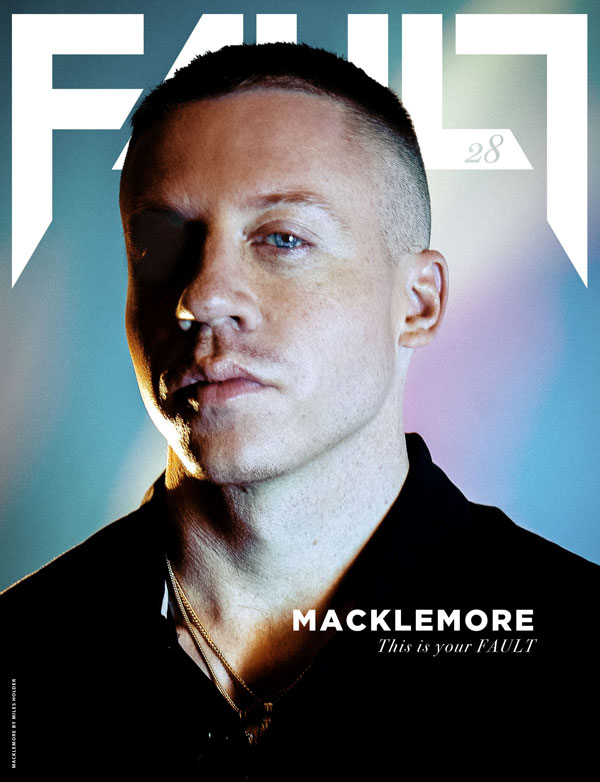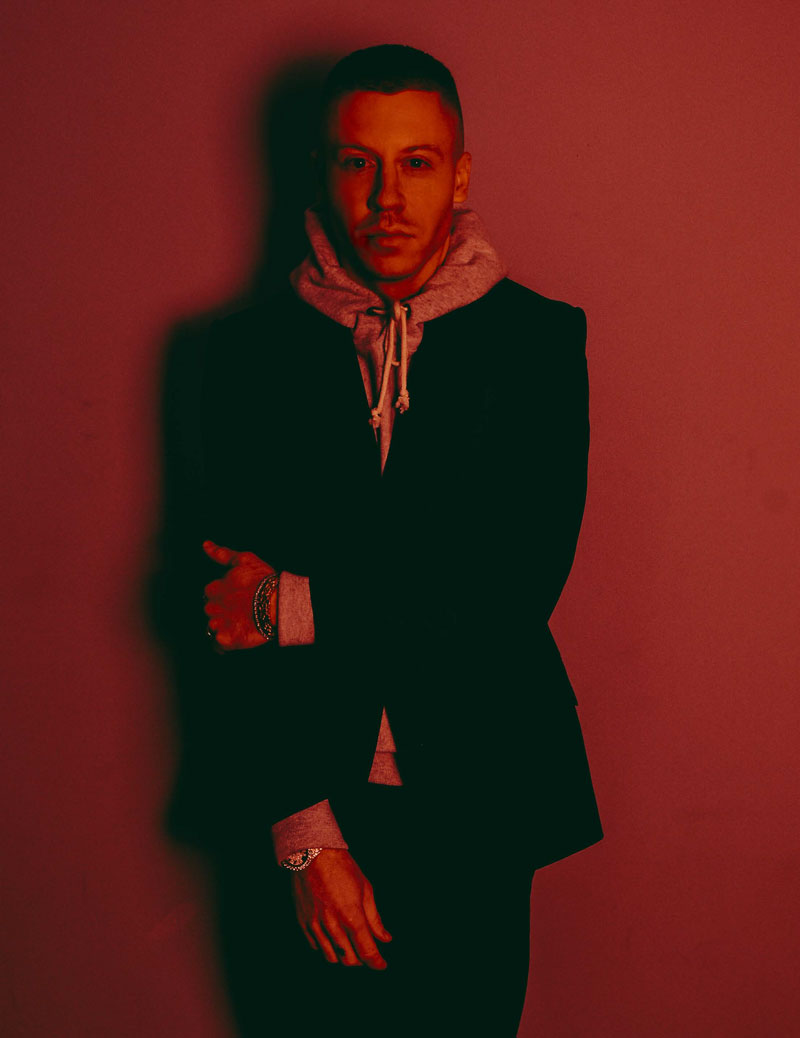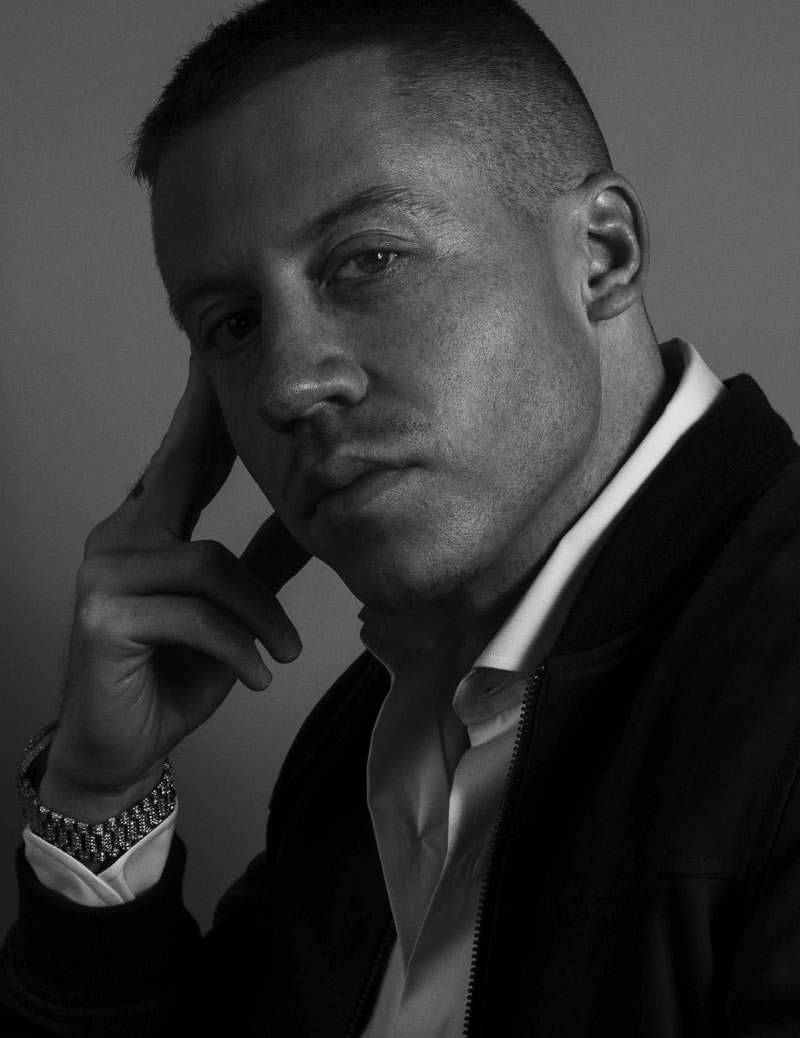Macklemore covershoot and interview for FAULT Magazine 28
Macklemore X FAULT Magazine

Macklemore’s road to success hasn’t been a smooth one, despite the runaway success of 2012 album ‘The Heist’ with then collaborator Ryan Lewis – behind the scenes the pressure caused the artist to slip from his addiction recovery and withdraw within himself.
In 2017, Macklemore released album ‘Gemini’, his first solo album in twelve years and for many, the first time they’d seen him without his longtime companion Ryan by his side. With a brand new track ‘These Days’ currently sitting at number one in the UK charts and the announcement on daughter number two ringing in our ears, we sat down with Macklemore to learn more about his solo journey, fatherhood and the ever present elephant in the room, white privilege.
Around 2012 with the release Can’t Hold Us and Thrift Shop many journalists referred to you as “new kid on the block” and as a “runaway newcomer” despite you already having a decade of music releases under your belt. Did that label annoy you?
Macklemore: It didn’t annoy me, I think that in a lot of ways I was an underground rapper and then six months later I was this international Pop Star, so it was a very different role very quickly, so I understood why they said it. People don’t see the work that goes into this stuff. I think mainly with the internet and social media; kids get famous quickly now, and for a good bulk of my career the internet wasn’t a thing that was accessible to a lot of people as it is today. It happened extremely quickly when it did, but it was a good decade before that that I was honing my craft.
You’ve been active in trying to explain your white privilege, even releasing a song of the same title onto your 2005 album ‘The Language of My World’. While commendable, why do you feel it’s essential for you to get the message across (possibly to the detriment of your fan base)?
Macklemore: To me, it’s the truth, and I want to acknowledge the systems in which we operate under in America. We are all under the system of white supremacy, and I do benefit from the colour of my skin in numerous ways, and that plays a factor in how I have an advantage regarding my art and concerning my career. To take from specific cultures and not acknowledge what’s going on is disingenuous. If I know the truth about it, it’s crucial for me to speak on the subject matter.
In that vein, why aren’t more artists doing it?
Macklemore: I think in a lot of ways some artists find it easier to stay quiet and think it’s easier for them not to say the wrong thing if they’re ignorant of the matter. There’s a lot of unpacking to do, and it’s not a subject where artists can say “oh I get it now” you’ve got to have conversations and do your research first. You’ve got to go back to the origin of America to see how this isn’t a philosophy or an ideology but that white supremacy has a history and has impacted the laws and systems in place today. For some, it’s easier just not to educate themselves.
Musicians and other media personalities often get called out for taking a political stance or are told to “shut up and dribble”, why is it essential for you as an artist to make your political opinion known?
Macklemore: I think that we as artists have platforms and we have the opportunity to engage with our fan base. I also don’t believe that it’s essential that all artists do that. Often people ask me “do you think that more people should be speaking up?” I feel that if you’re compelled to, and it comes from a real place, and it’s in your heart then that’s amazing. Music has always been a weapon of resistance for the people. There are songs that I wrote for Gemini which are much heavier but ended up not making the album because I didn’t feel like I was hitting it from the right angle. The songs weren’t saying what I wanted them to say and I don’t think that anybody should ever think that “ok now we have to have a political song to hit that quota”. These songs should always come organically should not feel contrived, or like you’re pandering. If it feels like I’m pandering, then I stay away.
What has been the hardest moment of your musical journey so far?
Macklemore: Adjusting to the fame in a condensed period and not staying sober has been the worst. There was a rapid transition and to have the world’s eye on me all at once with back- to-back number ones, and all the accolades that came with it – I didn’t know how to deal with it. I didn’t know how to adjust, so I escaped. I think a lot of that peak season when I was around a bunch of people, doing sold out Arenas across the world was me isolating and using drugs. I used drugs to cope it and to get out of my head. Dealing with the love, criticism and outside public perceptions is a balancing act. Over the years I figured out how to deal with it, and it’s by not giving a fuck. People always say, “I don’t care what people think of me” but we all care! We are all insecure, and it’s a human fault that ties us all together, but when you can acknowledge that, you can work consistently in a spiritual practice that lessens how much you care. When you realise who you sincerely are, and not through somebody else’s eyes but through your soul and your spirit, all of a sudden there’s inner peace. It takes work and maintenance, and if you’re paying attention to the media and you’re on social media all the time to look for validation, it’ll never come. There will always be somebody that’s disagreeing with what you’re saying; you have to be at peace with yourself.
Is it a lot of pressure to have a newborn child and suddenly having to leave to be on tour?
Macklemore: I don’t know if pressure is the right word, but it’s strange to spend eight days with my newborn and then to leave and go on tour. It’s tough to look at pictures, and O feel like I’m missing something, and in a way, I don’t even know my baby yet. I’ve been away from her more than I’ve been there and it’s hard, but FaceTime is a beautiful thing in the meantime. My baby wasn’t planned so we’re adjusting, and people have been doing this forever so I am looking forward to eventually slowing down and just honing in on family life and being a dad for a good while.
What is your FAULT?
Macklemore: Addiction. I think that’s the thing that always reminds me that I could lose all of this at any minute. If I stop prioritising the daily recovery program that I do to maintain sobriety – I will lose it all. It’s bigger than my career and more significant than record sales – it’s my family. It’s my happiness, my life. A lot people at the beginning of the recovery wish they were normal and asked, “why can’t I just drink and do recreational drugs like other people?” I don’t think like that anymore; I think my program has been a way for me to get closer to god and for me to figure out who I am. Recovery helped me discover my character defects and my shortcomings and how I can progress to become a better version of myself. It’s there to remind me that this life isn’t permanent and I can lose it if I don’t work to maintain that sobriety on a daily basis.


